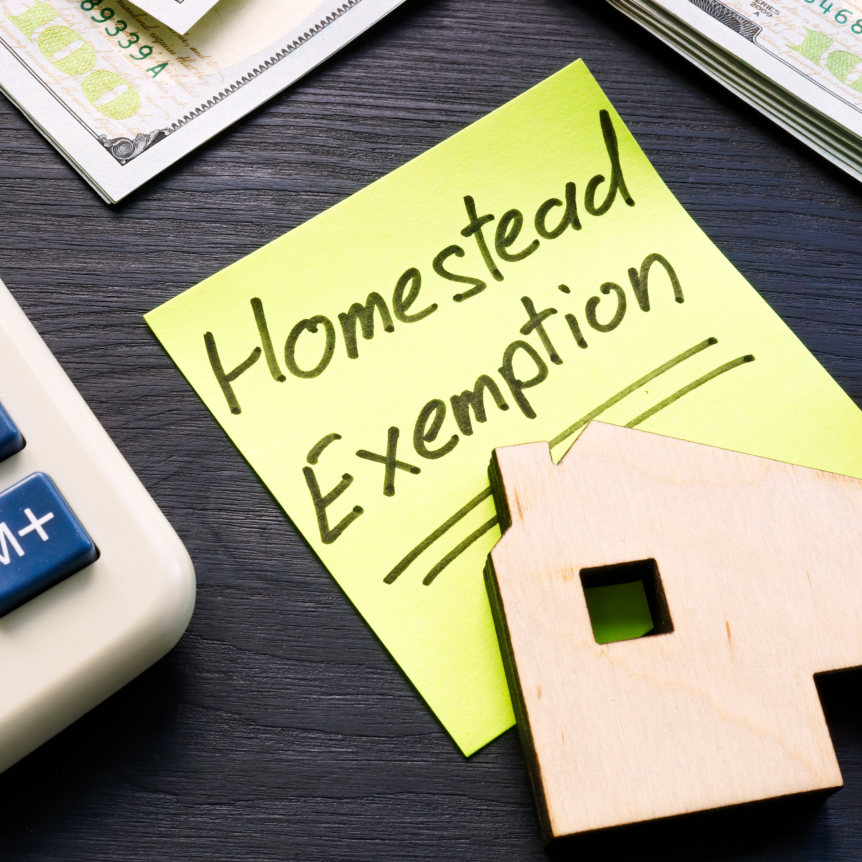Florida’s New Homestead Exemption: What Homeowners Need to Know About the Updated Law
One of the biggest benefits of living in Florida is the Homestead Exemption, which reduces the taxable value of your primary residence. Recent legislative changes have enhanced the Homestead Exemption, further bringing down yearly property taxes for Florida homeowners.
[TABLE OF CONTENTS]
- What is Homestead?
- Understanding the New Florida Homestead Exemption Laws
- Deadline for Filing Homestead Exemption in Florida
- Documents You Need to File for the Homestead Exemption in Florida
- Get Tax Planning Advice From a Professional
What is Homestead?
Homestead could mean different things depending on the circumstance. The types of property that qualify as homestead are: single family homes; condominiums; mobile homes; up to one half of an acre of contiguous land within a municipality; or up to 160 acres within the unincorporated areas of a county. The benefits of homestead are the creditor protection, the property tax exemption, and the restrictions on transfer.
Understanding the New Florida Homestead Exemption Laws
The newly-expanded Homestead Exemption reduces the assessed value on your home by up to $50,000. If you’ve lived in Florida full-time as of January 1, you could save up to $800 annually in property taxes. In addition, your assessed value cannot increase more than 3% per year once you are granted an exemption.
Homestead Exemption Will Match Inflation
Historically, Florida law has limited the increase in taxable value for a homestead property to no more than 3% per year. This Save Our Homes cap helped protect homeowners from dramatic property tax hikes due to increasing property values. Under Amendment 5, Florida’s homestead exemption will now take inflation into consideration for that exemption that applies to non-school taxes. Starting in 2025, the homestead exemption cannot rise more than 3% or the annual consumer price index (whichever is lower).
Portability of the Homestead Exemption
Homeowners looking to move within the state should be aware of the portability provision of the homestead exemption. Under Florida law, homeowners can transfer (or “port”) some or all of their homestead exemption benefits to a new home, subject to certain qualifications. Portability includes transferring the appreciated value of your home that has not been taxed.
Pro Tip: Are you moving? If you had a homestead exemption on another property in Florida within the last three years, you may be able to bring your Portability amount from your previous property to a new home. However, you must apply for it using form DR-501T and submit it with your new homestead exemption application.
Annual Assessment of Property Value
Every year, the property appraiser will assess the value of your home for tax purposes. This is to ensure that the Just Value of the property is correctly reflected and that any changes (like improvements or changes in market conditions) are accounted for. The Save Our Homes cap ensures that your property taxes won’t increase drastically each year.
Deadline for Filing Homestead Exemption in Florida
If you’re new to Florida, you’ll need to make sure the property is your primary residence by January 1st of the year you’re applying. The filing deadline is March 1st of each year. Under Florida law, failure to file for exemption by March 1 waives your right to the exemption privilege for the tax year.
The homestead exemption will continue to apply as long as you live in the home as your primary residence, and the property is still eligible. If you don’t move, sell the property, or change your residency status, the exemption will just renew automatically without you needing to file any additional paperwork.
Pro Tip: If you place your home into a trust, this is technically a change of ownership. Once the home is transferred, you must inform the Property Appraiser’s Office and file a new homestead exemption application. Failure to do so could have severe consequences for your property taxes.
Documents You Need to File for the Homestead Exemption in Florida
To file for the Homestead Exemption, you must provide a few key documents to verify your eligibility. Each county in Florida may have specific additional requirements or slight variations, so it’s a good idea to check with your local county property appraiser’s office.
Here’s a list of what you generally need:
- Proof of Ownership. You must be the owner or co-owner of the property you’re filing for. A deed to the property (or closing statement if recently purchased) can prove ownership.
- Proof of Residency. One of the following can prove your residency: a Florida Driver’s License, a Florida ID Card with your current address, a Voter Registration Card showing your Florida address, or Vehicle Registration in your name with your Florida address.
- Tax Identification. You’ll need to provide your Social Security Number or Individual Taxpayer Identification Number (IITN), if applicable.
- Proof of U.S. Citizenship or Legal Residency. If you’re not a U.S. citizen, you may need to provide proof of legal residency status (e.g., permanent resident card, visa).
- Trust Document. If you’re applying for homestead exemption for a property held in trust, you’ll need to submit a copy of the entire trust instrument with your application.
- Proof of Income and Age (if applicable). If applying for senior exemptions, you’ll need proof of age (e.g., birth certificate, driver’s license).
- Additional Documents (if applicable). You’ll need your marriage certificate if applying jointly with a spouse, income documentation for any special exemptions (such as those for disabled persons or veterans, etc.
- Application Form. Complete the Homestead Exemption Application Form provided by your county’s property appraiser office.
Get Tax Planning Advice From a Professional
While the legislation aims to make the tax system fairer and more efficient, homeowners must closely monitor how these changes affect their individual property tax situations and plan accordingly. Email us at hello@yolofskylaw.com today to make sure you’re taking full advantage of these changes.

